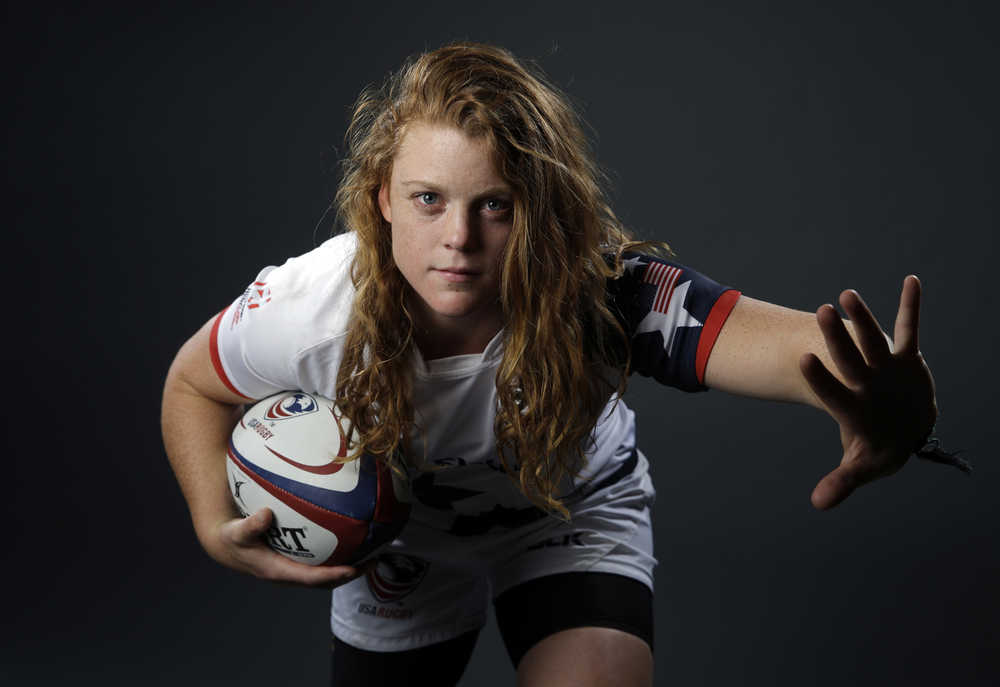They share locker rooms, they sing together, sometimes even ride to the games on the same bus.
It didn’t take long for Alev Kelter to recognize rugby might be her best, and most enjoyable, path to the Olympics.
Unlike the cutthroat worlds of junior hockey and soccer she grew up in, Kelter saw something unique in rugby: a sense of camaraderie that wasn’t always present in those other sports — to say nothing of a chance to compete in the Olympics, a goal she had come close to reaching in the other sports only to miss out near the final cuts.
“It’s never a negative experience to have that competitiveness, because you always get the best out of people that way,” Kelter said. “But in rugby, I want to keep that innocence of the competitiveness as we grow.”
Kelter grew up in Anchorage and was an elite hockey and soccer player. She played both sports at the University of Wisconsin — she was second-team All-Big Ten in soccer as a sophomore and scored 15 goals in hockey her senior season.
She was a frequent participant in national camps, with legitimate chances to make the Olympics in either, or both, sports. But the “best athletes” often get passed over for the best hockey or soccer player when it comes to naming a squad at that level. It may have been Kelter’s reluctance to choose one over the other that set her back ever so slightly.
“But I took that chance of playing both because I was passionate about it,” she said.
She’d do it over again, she insists. Yet, after hearing the same dreaded word — “No” — so many times, she had to take time to re-evaluate the spot sports should have in her life.
“You have a lot of dreams that get shattered,” she said. “To hear the nos, it really made me think about, ‘What’s my purpose? What am I doing?’”
Off to the mountains she went. For the first time she could remember, Kelter was not, as she called it, “under contract,” with Wisconsin, a junior team or anyone else. She snowboarded with abandon, knowing she could break a bone — or do anything — and only have to answer to herself.
It gave her the freedom to move on, and at around that time, she received a call from the U.S. rugby coach at the time, Ric Suggitt, who was trying to build a team for the sport’s first appearance at the Olympics since 1924. He asked one of his players, Lorrie Clifford, who could help the U.S. win a gold medal in Rio. Clifford didn’t hesitate. Her childhood friend could: “Alev Kelter.”
“Once we had Alev, I just started laughing,” Suggitt said. “She was unbelievable. Very, very raw but you could see how athletic she was. You could see all she’d learned from playing soccer, from playing ice hockey, at the highest level.”
Suggitt says Kelter’s soccer skills make her arguably the best restarter in the world right now. A restart, in some ways, resembles a kickoff in American football, in that either team can grab possession after the ball travels 10 meters. But in rugby, it’s possible to kick the ball so high that the kicking team has time to run under it and compete for possession.
Kelter’s best skill, according to her former coach, is her ability to kick it so high “my grandmother has enough time to run underneath and get the ball.”
The International Olympic Committee added Rugby Sevens to the program starting this year in Rio. The sport is a fixture in other countries — Australia, New Zealand, South Africa — but more on the developing side in the United States. If things go right for the Americans — and that would include Kelter kicking her best — they could contend for a medal.
Either way, she’s convinced she’ll have a great time.
After all, it calls for just that in the rulebook.
Kelter was fascinated by some of the passages from the laws of Rugby Union — passages that probably wouldn’t be found in the rulebooks of most other sports:
—”The long standing tradition of players from competing teams enjoying each other’s company away from the pitch and in a social context, remains at the very core of the Game.”
—”Rugby has fully embraced the professional era, but has retained the ethos and traditions of the recreational Game.”
Kelter saw all that and knew she wanted to be part of it.
“It gives me chills, because I didn’t have that growing up with hockey and soccer,” she said. “Those sports, you might sneeze wrong and someone will take your spot. In rugby, there’s a spirit. You show your competitiveness on the field in the most appropriate way, and then afterward, you’re really good friends.”

